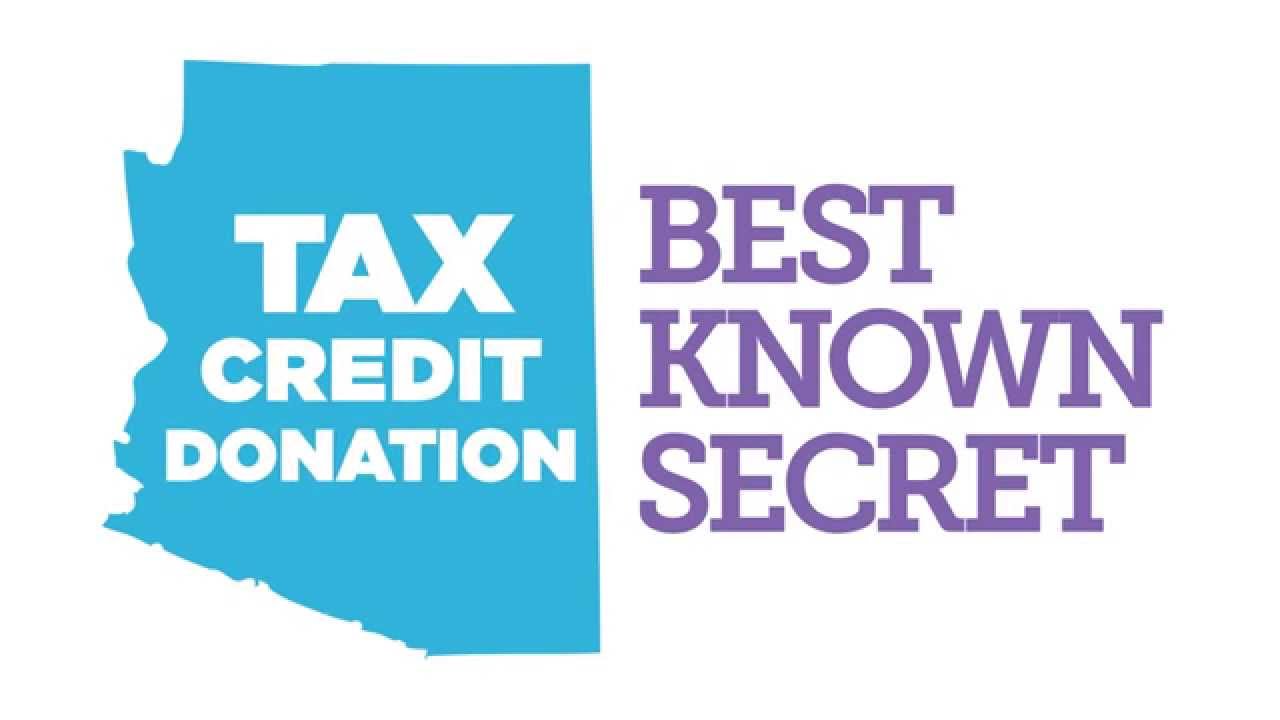[quote_box_center]Note: Above video and related website clearly explains all of the tax credits available to Arizona residents.[/quote_box_center]
Need knows no season and not every life-changing situation is budgeted for ahead of time.
Fortunately, there’s a no-cost way for Arizona taxpayers to support local nonprofits that help members of the community who are in crisis. It involves taking advantage of the “Credit for Donations made to Qualifying Charitable Organizations.”
[quote_box_right]
Give a little, get a little
➤ Take advantage of “Credit for Donations made to Qualifying Charitable Organizations” by Dec. 31 and get the same amount taken off of your tax liability. Any amount up to $400 for families and $200 for single filers.
➤ Same increments available as a separate tax credit for donations made to organizations involved with foster care. Catholic Charities Community Services is one example.
Discern a place to donate
- Pregnancy support: Aid to Women Center, First Way, Life Choices Women’s Clinic, Maggie’s Place
- Homelessness: André House, Furnishing Dignity
- Various services: Catholic Charities Community Services, Foundation for Senior Living, Paz de Cristo,
St. Vincent de Paul - Unemployment: St. Joseph the Worker
- Medical needs: Circle the City
➤ Still unsure about a tax credit? Download free 10-page e-book
[/quote_box_right]
It’s a very long way of saying that cash donations can become a two-way gift. If they’re sent by mail or online to any of an array of reputable, or “qualifying” charities by Dec. 31, there’s a dual gift involved. The donor strengthened the charity’s operating budget and receives that same amount off of the total tax liability when filing a personal return.
The only catch: there’s a maximum amount the government allows donors to take off of their income tax. It’s up to $400 for families and $200 for those filing individually.
Whether the donation is $1 or any affordable amount up to or beyond the maximum, it makes a huge difference for the charity involved. Its staff and volunteers devote their lives to journeying with those in crisis.
Supporting a pregnancy
Most clients don’t have insurance, but even those pregnant women who do still choose places like Aid to Women Center for prenatal care because they say they feel comfortable there. Staff and volunteers treat each person with dignity and welcome them with open arms, even if they’re abortion-minded, said Kelly Sarotte, R.N., executive director.
One such woman credited Aid to Women Center for saving her baby girl’s life. The center opened a second Tempe location in August to better serve teenagers and young adults who are most vulnerable to having an abortion or a sexually transmitted illness.
“We felt it important to be right where this target group is,” Sarotte said. “We have tremendous foot traffic in our new second location.”
It’s a block or so north of Arizona State University. Aid to Women Center is also on campus weekly when it shares an information table with ASU’s Students for Life club. As a result, the pro-life charity served 880 clients this year, which is a 53 percent increase.
That includes an ASU engineering student who once considered abortion due to the timing of her pregnancy and marital status. That woman’s education track has included Aid to Women Center’s parenting program for over a year now. She is on track to graduate from ASU next year.
Charitable donations would support prenatal medical care and lab work for pregnant women who can’t afford medical care, or ultrasound training for two nurses to provide a window into the womb for abortion-minded women. They would also support educational material for moms and dads in waiting. Those classes, in turn, earn them material support for their baby.
Making people feel at home
Whether it’s making room for a baby or simply starting over in a new place, turning a house — or apartment as the case may be — into a home can be a challenge when there’s a lack of financial resources. That’s where agencies like Furnishing Dignity can help.

Three Catholic moms established the volunteer-driven charity earlier this year to restore the dignity of a person or family bouncing back from homelessness or other major setback while furnishing their new digs. They connect with approved Arizona charities like St. Vincent de Paul and the Arizona Friends of Foster Children Foundation to verify need and secure participants. That way, they know material and financial donations will support clients who have a greater chance at permanent self-sufficiency due to follow up support from referral agencies.
Part of Furnishing Dignity’s unique outreach is supporting teenagers as they age out of the foster care system. The nonprofit recently filled 20 “Baskets of Love” with toiletries, linens and basic kitchen items that teenagers and young adults who were never adopted will need when living on their own.
Each laundry gift basket included a gift certificate of sorts with Furnishing Dignity’s contact information so the two can connect when moving day comes. Some were waiting to secure a roommate or a job and expect to move in the next three-to-six months.
“We may be their only support. There is no one else,” said Lisa Campbell, co-founder and vice president of Furnishing Dignity.
Whether it’s helping someone from foster care or a family of any size, the mission is the same: move in basic furnishings acquired as donations — with the exception of mattresses that are purchased new — and remind clients that caring people are within reach.
“We go into homes where there’s absolutely nothing. Literally blankets on the floor where the kids sleep,” Campbell said.
Volunteers don’t leave until beds are set up, shower curtains are installed and there are places to sit, both comfortably and for dining. One of their latest deliveries even included a Christmas tree.
“By providing the comforts of home that most of us take for granted, it lightens the load a little because most people find refuge at home,” Campbell said.
Aiding job-seeking clients
The individuals that St. Joseph the Worker serves don’t always have a home. They’re in a shelter at the county’s Human Services Campus or elsewhere. Sometimes they recently transitioned to their own place, but that’s only after St. Joseph the Worker gave them the resources and tools to secure meaningful employment.
It’s simple things such as Internet access to complete online applications, resumé help, clothes and coaching for a job interview plus a bus pass to get there that make a world of difference. So does money to purchase work-related items and small McDonald’s gift cards once they’re hired in order to get a true lunch break.
Such items allowed 2,701 St. Joseph the Worker clients to regain self-esteem the last fiscal year and find the positive outlook they lost long ago. More importantly, they secured employment with average wage well above the state minimum and 41 percent of clients eligible for benefits. Such high success rates continue with the opening of a satellite office in Phoenix’s Maryvale office this summer and ongoing outreach via its original location and a mobile unit.
In the first four months of this fiscal year, St. Joseph the Worker already assisted 1,502 individuals in securing employment. That’s a 71 percent increase from the same period last year.
“We are on track to support more than 3,200,” said Candace Sherwood, director of development. “As the largest privately funded employment support agency in Arizona, our work can only go as far as our financial donations allow. With the increase in the number of individuals being served, we rely on the community now more than ever to help fund our work and help transform lives and the communities in which they live and work.”
Helping patients heal
For vulnerable members of the community, working isn’t an option until they heal. Those who are homeless only have the streets to do that. That is, unless they’re fortunate enough to be connected with Circle the City. The organization, founded and led by a Sister of St. Joseph of Carondelet, was established in 2008 to full unmet medical needs of those in Maricopa County.
This last fiscal year alone, its round-the-clock medical team offered nursing supervision — which includes services such as wound care and IV therapy — to 303 patients. The number jumps to more than 700 patients since its inception.
The numbers are great, but Circle the City’s 50-bed medical respite center is full with more than 30 patients on the waiting list, said Liz Meyers, spokesperson for Circle the City. Patients stay an average of 35 days for medical monitoring plus speech and occupational therapy sessions as needed. On-site psychiatric consultations, general mental health counseling and substance abuse services are also available.
“Circle the City is committed to ensuring that each person admitted is given the chance to medically heal and stabilize,” Meyers said. “Circle the City’s case management team works diligently to connect our patients with relevant benefits, income and, most importantly, housing. At CTC we know that stable healthcare and stable housing are synonymous: one can’t exist without the other.”
More than 79 percent of Circle the City patients who successfully completed the program have been connected with housing other than the street or emergency shelter. Donated funds keep its mission going. They’re essential to providing uninsured and under-insured patients with cost-efficient medical care, meaningful human services and assistance in their journey toward independent living.







